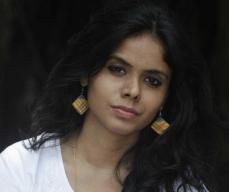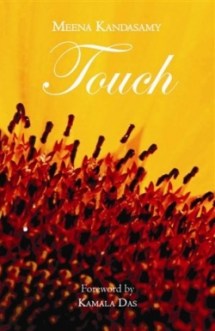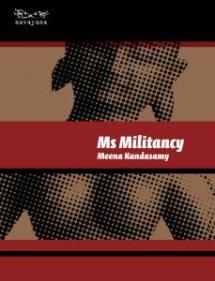Download podcast (24 mins)
“Behind all art is an element of desire. … Love of life, of existence, love of another human being, love of human beings is in some way behind all art — even the most angry, even the darkest, even the most grief-stricken, and even the most embittered art has that element somewhere behind it. Because how could you be so despairing, so embittered, if you had not had something you loved that you lost?” – Adrienne Rich
Meena Kandasamy writes poems that acknowledge duality. That suffering may live beside light, that anger may hold joy, that, as playwright Erik Ehn has said, “loving and killing meet at the closure of a circle.” Her language – scathing, sensual, frustrated, as well as playful – reflects the coexistence of innumerable realities in contemporary India.

Meena is a young writer from India’s southeastern-most state, Tamil Nadu, where a fiercely proud people speak the ancient Dravidian language of Tamil and practice a distinct culture replete with traditions of dance, music, literature, and religious ritual. Tamil Nadu is also notoriously caste-conscious, an issue which motivates much of Meena’s writing. Her poetry reveals a society that continues to sanction violence and discrimination toward Dalits – India’s lowest caste group, traditionally known as untouchable. Meena deconstructs a system that is deeply embedded in Indian cultural as well as institutional life, articulating fierce critiques as well as a long history of resistance and struggle for caste annihilation.
Whether she is writing about sexuality, caste, political violence, grassroots struggles, language, or love, Meena is wholly committed to poetry as action – a discourse that fearlessly uncovers and critically analyzes what needs to change. Unlike obscure academic writing or polished human-rights language, Meena’s poetry is raw and unbridled – “full of jagged edges,” she writes.
When we spoke with Meena in Chennai, Tamil Nadu’s capital city, words bubbled out of her. We discussed her preference for poetry, the politics of language, India’s controversial caste reservation policies, and the quest for caste annihilation. She also read a few of her poems for us, which we’ve transcribed below.


Their Daughters
Paracetamol legends I know
For rising fevers, as pain-relievers—
Of my people—father’s father’s mother’s
Mother, dark lush hair caressing her ankles
Sometimes, sweeping earth, deep-honey skin,
Amber eyes—not beauty alone they say—she
Married a man who murdered thirteen men and one
Lonely summer afternoon her rice-white teeth tore
Through layers of khaki, and golden white skin to spill
The bloodied guts of a British soldier who tried to colonize her. . .
Of my land—uniform blue open skies,
Mad-artist palettes of green lands and lily-filled lakes that
Mirror all—not peace or tranquil alone, he shudders—some
Young woman near my father’s home, with a drunken husband
Who never changed; she bore his beatings everyday until on one
Stormy night, in fury, she killed him by stomping his seedbags. . .
We: their daughters.
We: the daughters of their soil.
We, mostly, write.
—
Mulligatawny Dreams
anaconda. candy. cash. catamaran.
cheroot. coolie. corundum. curry.
ginger. mango. mulligatawny.
patchouli. poppadom. rice.
tatty. teak. vetiver.
i dream of an english
full of the words of my language.
an english in small letters
an english that shall tire a white man’s tongue
an english where small children practice with smooth round
pebbles in their mouth to the spell the right zha
an english where a pregnant woman is simply stomach-child-lady
an english where the magic of black eyes and brown bodies
replaces the glamour of eyes in dishwater blue shades
and the airbrush romance of pink white cherry blossom skins
an english where love means only the strange frenzy
between a man and his beloved, not between him and his car
an english without the privacy of its many rooms
an english with suffixes for respect
an english with more than thirty six words to call the sea
an english that doesn’t belittle brown or black men and women
an english of tasting with five fingers
an english of talking love with eyes alone
and i dream of an english
where men
of that spiky, crunchy tongue
buy flower-garlands of jasmine
to take home to their coy wives
for the silent demand of a night of wordless whispered love . . .



Thanks Meena , Your “English” is Pretty Rgds!! Veera
@24mts..podcast is more or less a treatise and answers the contemporary and past country called India. ;though i do not subscribe that India is a Nation.We see things as we are.she has covered numerous topic ranging from education; politics;oppression;poetry; discontentment of being Indian as much Hindi is one of the regional language though for official sanctity. Being that one who lost our mother tongue to Hindi.I know Hindi is not India nor north India is India.
She has ,very beautifully chronicled that study of Hindi by compulsion as much the alms thrown as piece of remnant breads..to us in the name of reservation, defining merit and talent through myopic eyes based on caste and community ; so disgusting,and embodies the folly and farce of the calumny society.
Her unmuted expression, our struggle for own identity at all walks of life,, prejudice and discrimination on color,caste, community,, making one to feel guilty, with their halo effect of branding a caste;Who needs their alms/affirmative action when the society usurps the very life/and labor by design and doctored karma.Reservation is more a fraud and a mockery in a country, who merits on a caste and community;.entire social and economic infrastructure is enjoyed by this society at someones tolerance and.innocence .she is right in saying caste is barrier to our aspirations and expectations. Expression of emotion;sublimity and our Utopian dreams; often interred with vestige of our buried past and hoping souls.
If i can epitomize ” she is a flower born to blush seen; All we behold Her to be full of blessings.”:…Ravi
Hi meena, i have seen your interview in a malayalam channel.I personally like your way of thoughts. I always like to hear the persons who know the life than me, in that sense you remind me some realities in present life.I wish you all the best for your journey to the world of thoughts. God may bless you. And thanks